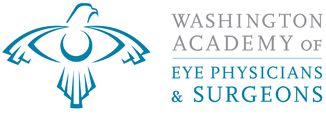WAEPS - Monthly Scientific MeetingsJoin your colleagues for an accredited monthly learning session presented by top experts in a variety of ophthalmology sub-specialties. These monthly meeting sessions are presented jointly with the University of Washington Department of Ophthalmology and are available to WAEPS members throughout the state via attendance in-person at the UW location, online via Zoom, or by watching the recording of the live session. Within a week, a recording of each session will be made available on the WAEPS website so members can watch at their convenience. These recorded sessions are approved for CME credit. To claim credit, members must complete a brief learning evaluation after viewing each video. The video recordings and evaluations can be found in our Monthly Meeting Archive. This year we are pleased to welcome the following esteemed speakers for our Monthly Meeting Series:
Location: Harborview Campus (HMC) NJB (Ninth & Jefferson Building) 7th Floor Conference Room & on Zoom. For more information, visit the Grand Rounds page of the UW website. CME Information for Live Sessions (In Person and on Zoom):Accreditation with Commendation: The University of Washington School of Medicine is accredited by the Accreditation Council for Continuing Medical Education to provide continuing medical education for physicians. Credit Designation: The University of Washington School of Medicine designates this live activity for a maximum of 31 AMA PRA Category 1 Credits™. Physicians should claim only the credit commensurate with the extent of their participation in the activity. (Each session is worth 1 credit) CME Information for Recorded Videos:Accreditation with Commendation: The University of Washington School of Medicine is accredited by the Accreditation Council for Continuing Medical Education to provide continuing medical education for physicians. Credit Designation: The University of Washington School of Medicine designates this Enduring Material for a maximum of 15 AMA PRA Category 1 Credits™. Physicians should claim only the credit commensurate with the extent of their participation in the activity. Recordings of Meetings for CMEView Past Monthly MeetingsLogin Required Recordings from prior years are not eligible for CME. The videos which can be watched for CME credit are marked. Enduring Material Notice:Within two weeks of the live session, a recording of each session will be made available on the WAEPS website at this link: Monthly Scientific Meetings. Members can watch at their convenience, though you will need an internet connection and you will need to be logged into your WAEPS account to do so. Each video is worth 1 hour of CME credit. To claim CME credit for watching the on-demand video, you must complete and pass the associated quiz linked below the video. You will get two tries to pass the quiz. The required passing score will be listed on the quiz. An evaluation will also be linked with the video. It is not required to get CME credit, but we do ask that you complete it so that we can continue offering this lecture series. Videos that were recorded between October 1, 2025 – May 31, 2026 will be available for credit until October 1, 2026. After that date, you may then download your CME certificate using this link. If you have any questions regarding the process for claiming CME credit, please contact Milo Cousins at [email protected]. For video access and information, visit the WAEPS website. (Login required) Please contact [email protected] if you have any questions about this program. |
